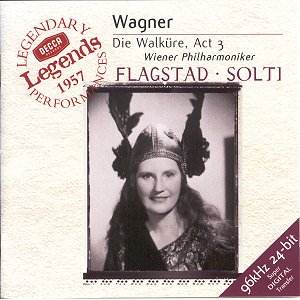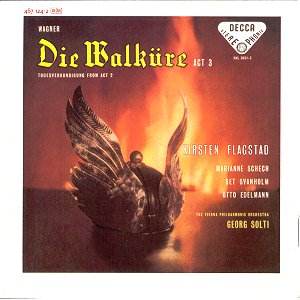Richard WAGNER (1813-83)
Die Walküre, Act 3.
 Kirsten
Flagstad (soprano) Brünnhilde; Otto Edelmann (bass) Wotan; Marianne
Schech (soprano) Sieglinde; Ode Balsborg (soprano) Gerhilde; Ilone Steingruber
(soprano) Ortlinde; Grace Hoffman (mezzo) Waltraute; Margaret Bence (contralto)
Schwertleite; Claire Watson (soprano) Helmwige; Anny Delorie (contralto)
Siegrune; Frieda Roesler (soprano) Grimgerde; Hetty Plümacher (contralto)
Rossweise; Vienna Philharmonic Orchestra/Georg Solti.
Kirsten
Flagstad (soprano) Brünnhilde; Otto Edelmann (bass) Wotan; Marianne
Schech (soprano) Sieglinde; Ode Balsborg (soprano) Gerhilde; Ilone Steingruber
(soprano) Ortlinde; Grace Hoffman (mezzo) Waltraute; Margaret Bence (contralto)
Schwertleite; Claire Watson (soprano) Helmwige; Anny Delorie (contralto)
Siegrune; Frieda Roesler (soprano) Grimgerde; Hetty Plümacher (contralto)
Rossweise; Vienna Philharmonic Orchestra/Georg Solti.
 Decca
Legends 467 124-2 [ADD] [70'57] Recorded
1957.
Decca
Legends 467 124-2 [ADD] [70'57] Recorded
1957.
Crotchet
Midprice

Originally coupled with the Todesverkündigung from Act Two, this
performance provides an ideal complement to Solti's later famous Ring cycle.
Certainly, there is a certain give and take if one compares the two performances.
Marianne Schech's Sieglinde does not match Crespin, for example, and Edelmann
is no Hans Hotter, but there is nevertheless a sense of discovery about this
account that makes for compelling listening.
John Culshaw's short essay on recording Act Three is reproduced in the booklet
describes how 'stage' conditions were recreated in the studio. A sense of
the theatre, it is true, is high on the agenda here.
From the opening Walkürenritt, there is a sense of restless,
underlying energy. The dynamo for this energy is, of course, Georg Solti,
who paces the unfolding drama with a sense of inevitability (even though
there are times when a little more 'give' may be appropriate). Throughout
this act one is aware that monumental events are afoot. A pity, then, that
the final moments lack that final measure of grandness. Otto Edelmann's Wotan
is partly responsible, whose invocation of Loge could have carried more
authority. However, where Edelmann consistently scores is in his diction,
which is exemplary throughout. A bigger, heavier voice would seem more
appropriate to represent the (ostensibly) most powerful being in the Wagnerian
universe: on occasions, he is nearly drowned out by the orchestra. At Des
Augen leuchtendes Paar he sounds literal, a fault only emphasised by
the orchestra's wonderfully touching playing at this point. Also, he sounds
less than furious at his entrance, where his outrage should be overpowering.
Flagstad's Brünnhilde is proud and determined, belying her age. There
is a wealth of experience and profundity in her utterances. Her account of
War es so schmächlich carries real intensity of expression, but
this is but one highlight of a reading that feels so right. The Valkyries
work as an infernal team (in the best sense), truly intimidating in their
resolve. The detailed recording means that a wealth of orchestral detail
is there to be discovered.
Any student of the Ring should here this performance for its visceral intensity.
Any Wagner lover will not be disappointed.
Colin Clarke
Performance

Recording



